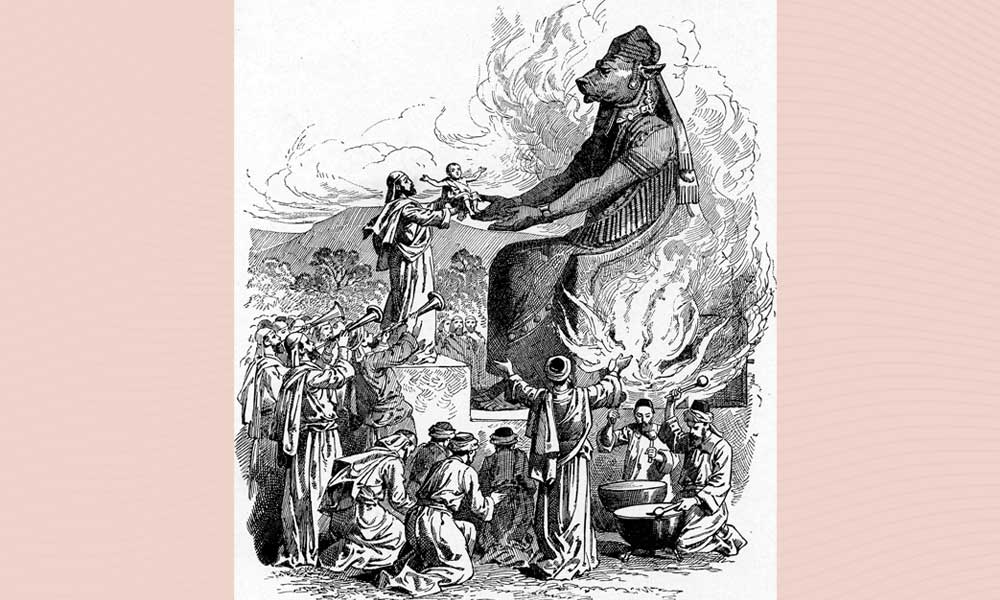In 2012, days after the mass shooting at Sandy Hook Elementary School that killed 20 children and six adults, historian Garry Wills wrote an impassioned essay in The New York Review of Books. Titled simply “Our Moloch,” it compared America’s devotion to guns to an ancient form of sacrifice, recorded in the Hebrew Bible, in which children’s lives were offered to an idol. “The gun is our Moloch. We sacrifice children to him daily,” wrote Wills. “One cannot question his rites, even as the blood is gushing through the idol’s teeth.”
The term “Moloch” is found in Leviticus and Deuteronomy, where Israelites are instructed “not to pass your children through the fire to Moloch.” (The correct transliteration is Molekh, but Moloch—pronounced “Molok”—is the most common English adaptation.) Although scholars are still uncertain about the precise identity of the ancient Moloch, the word persists in Western culture as a potent metaphor for capitalism, war and even artificial intelligence.
Daniel Vainstub, professor of archaeology and Near Eastern studies at Ben Gurion University of the Negev, believes that child sacrifice was mainly a Canaanite practice that some Israelites borrowed when they came to the land between the 13th and 11th centuries BCE. Several books of the Hebrew Bible condemn Israelites for engaging in it, including Judges, Kings and Jeremiah. “Child sacrifice was a practice that had some currency,” says Robert Alter, the biblical scholar and translator.
Vainstub says that archaeological, linguistic and literary evidence shows that Moloch was not a deity, as suggested by biblical grammar, but rather a form of sacrifice most often made to Baal, the Canaanite high god. The preeminent 11th-century French rabbi Rashi believed that this sacrifice involved throwing screaming children into a furnace built into a brass bull-headed statue. Among Israelites, child sacrifice seems to have been eradicated by King Josiah, who reigned until 609 BCE.
The memory of Moloch’s flames was mostly dormant through the medieval period. But coals glowed anew in the early modern era when Moloch appeared in John Milton’s Paradise Lost (1667) as one of Lucifer’s allies—“horrid King besmear’d with blood / Of human sacrifice, and parents tears.” Moloch made several other cameos in 19th-century poems and novels, but the word’s full modern allegorical meaning—as a rapacious societal force demanding a great and terrible sacrifice—didn’t really catch fire until 1956, in the second section of Allen Ginsberg’s iconic poem “Howl.” “Moloch whose mind is pure machinery! Moloch whose blood is running money!” wrote Ginsberg. “Moloch whose fingers are ten armies! Moloch whose breast is a cannibal dynamo! Moloch whose ear is a smoking tomb!”
For Ginsberg, Moloch personified ruthless Capitalism, the relentless idol of greed and consumerism that enthralls humanity and drives it to sacrifice its future. Twentieth-century artistic depictions of Moloch intersperse gloomy city skylines with fiery industry. In one striking woodcut by New York artist Lynd Ward, smokestacks, skyscrapers and hellish flames frame Moloch’s colossal glowering face. Bodies tumble out of the skyscrapers into a heap before the heavy dollar-sign chain around Moloch’s neck.
Today, Moloch represents any terrifying force to which children are “sacrificed,” as in Wills’ essay on guns or, in other circles, abortion. “Whether modern pro-abortion advocates realize it or not, in essence their attachment to the slaughter of the unborn is an allegiance to Moloch,” high school teacher Thomas Shaffern wrote last year for Crisis Magazine, a Catholic publication.
But perhaps no “Moloch” has the potential to wreak as much devastation as the one proposed in 2014 by psychiatrist and blogger Scott Siskind, a.k.a. Scott Alexander. In “Meditations on Moloch,” Alexander warned that the rapid development of AI could give rise to an uncontrollable superintelligence that could wipe out humanity. “All of our technology, all of our civilization, all the hopes we invested in our future—might be accidentally handed over to some kind of unfathomable blind idiot alien god that discards all of them, and consciousness itself,” wrote Alexander. Thanks to the title of the essay, Moloch quickly caught on in tech circles as shorthand not only for the potentially apocalyptic superintelligence, but also for the market forces involved.
Nick Bostrom, author of the groundbreaking AI book Superintelligence, says that the term “describes an important set of phenomena. Maybe if we can recognize them more, we will be able to take a step back and try to design systems less likely to produce these Molochian outcomes.”
Although none of these modern applications of “Moloch” would be fathomable to King Solomon, Jeremiah or Rashi, Gershon Winkler, a rabbi who studies lesser-known Jewish lore, believes they are in line with biblical intent. “Then as now, Moloch represents contradicting your better judgment for the sake of a higher cause, a greater truth—that in reality was neither.”
Opening picture: Charles Foster
Moment Magazine participates in the Amazon Associates program and earns money from qualifying purchases.



I would agree with the H.S. teacher’s assessment. As for “Meditations on Moloch”, concerning AI, just watched an interesting program led by Amir Tsarfati and Jack Hibbs regarding the Senate hearing on AI with their own commentary. Check it out!
Sorry, the discussion was not on AI…something else. It was the House Subcommittee in July, discussing UAP’s (UFO’s.)